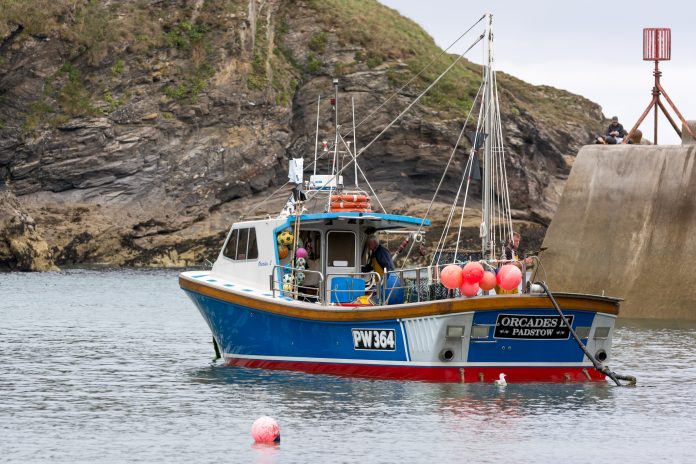Chris Thorne, Oceans Campaigner at Greenpeace UK explains why supertrawlers have no place in the UK’s marine protected areas
Supertrawlers are vast floating fish factories, capable of catching and processing hundreds of tonnes of fish each day using nets up to a mile long. The largest can carry over 7,000 tonnes of fish, that’s the same weight as the Eiffel Tower. We define a supertrawler as a freezer trawler over 100m in length.
Fishing in the UK’s Marine Protected Areas
These behemoths are driving the overfishing, which has decimated fish stocks, and they have absolutely no place operating in parts of our oceans that are supposed to be protected. However, Greenpeace investigations have revealed that supertrawlers spend thousands of hours each year fishing in the UK’s Marine Protected Areas.
In fact, supertrawler fishing time in the UK’s network of Marine Protected Areas has doubled every year since 2017 and far into 2020, they’ve already spent over 6,000 hours fishing in allegedly protected parts of the UK’s waters – that’s equivalent to more than 232 entire fishing days in just six months.
What’s worse, they do this with the blessings of the UK Government. Despite setting up a network of Marine Protected Areas around the UK, covering around 30% of the UK’s waters, this network is little more than a series of ‘paper parks’ – lines drawn on a map with no tangible protections. The situation is particularly bad in the UK’s offshore Marine Protected Areas, those more than 12 nautical miles from the coast. This is because the Common Fisheries Policy makes it difficult for our Government to introduce stronger fishing restrictions in offshore waters.
Just five out of the UK’s 73 offshore protected areas ‘may be’ progressing towards their conservation targets, and just two out of the 73 have any site condition monitoring to accurately assess their progress towards conservation targets. The UK Government has designated this network over the last decade, and then forgotten about them while continuing boasting about being a ‘global ocean champion’ on the world stage.
This rhetoric is utterly at odds with the reality, and the failure of our Marine Protected Areas is no surprise when you learn just how extensive destructive fishing practices are in the UK’s protected areas.
Industrial bottom trawling
As well as vast supertrawlers, bottom trawlers operate with impunity in most of the UK’s MPAs set up to protect the seabed. A recent investigation found that 97% of the UK’s protected areas set up to protect the seabed experience industrial bottom trawling. Pulse trawlers stalk some of our protected areas, electrocuting fish off the protected seabed.
The fact that the UK Government allows all of this to take place in areas that are supposed to be protected is ridiculous. Allowing a bottom trawler to plough through a protected area of the seabed is equivalent to driving a bulldozer through a protected forest. It makes a mockery of the word ‘protected’.
The UK’s oceans in crisis
We need Marine Protected Areas, covering at least 30% of the UK’s waters, because our oceans are in crisis here in the UK, and around the world. Fish stocks have been severely depleted by decades of industrial overfishing, and our coastal communities are suffering as a result. Our small scale, more sustainable fishers here in the UK have to work 17 times as hard now than they did for the same quantity of catch a century ago.
Marine Protected Areas will help our fishers by boosting fish populations and ensuring their long-term survival, which, in turn, will secure the survival of our coastal communities. By placing large areas of ocean off-limits to all industrial fishing, it gives fish stocks space to recover and grow and safeguards habitats. This will boost stocks within the protected areas and also provide significant spillover benefits, with fish populations being boosted over a much wider area.
Marine Protected Areas which are protected in name only provide none of these benefits. The UK’s protected areas, particularly those in offshore waters, are little more than a cheap PR stunt by the UK Government.
The UK Government keeps on saying that Britain’s impending departure from the Common Fisheries Policy will give it new powers to better protect our offshore protected areas. Bearing in mind our departure from the Common Fisheries Policy, our Government is yet to provide any sort of credible commitment to using these renewed powers to properly protect our oceans.
In fact, in early October 2020, our Government voted down an amendment to the new Fisheries Bill, which would have committed them to ban supertrawlers from the UK’s Marine Protected Areas. Their rhetoric about properly protecting our oceans after Brexit rings hollow.
The future of the UK’s oceans
If we can properly protect our oceans, we can not only save our seas after decades of industrial overfishing and destruction which has pushed them into crisis, but we can also save our struggling coastal communities, and ensure there are still fish to catch for this generation of fishers, and for generations to come.
Time is running out to protect our oceans, but we will keep campaigning and are determined to do all we can to protect our oceans while the UK Government refuses to act.











